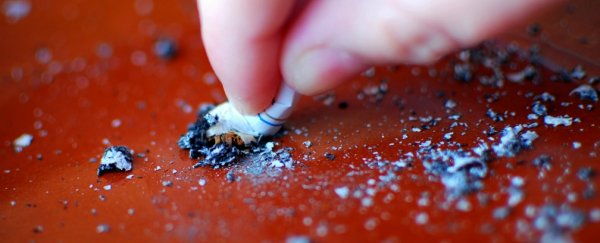In the struggle to help people give up cigarettes, scientists have tried everything from slow-release nicotine patches and gums to nicotine vaccines. But now researchers in the US have found a bacterial enzyme that devours nicotine in the bloodstream, and it could be the tool that helps people quit for good.
The goal is to turn the enzyme into a therapeutic drug that would be used to eat up the nicotine in a smoker's body before the chemical gets a chance to deliver that addictive feel-good hit to the brain. No nicotine high = no overwhelming biological urge to keep smoking.
"The bacterium is like a little Pac-Man," lead researcher Kim Janda, a chemical biologist at the Scripps Research Institute, said in a press release. "It goes along and eats nicotine."
So far, the enzyme, which is called NicA2, has only been trialled in the blood of mice, but the researchers are already testing its potential as a human drug.
"Our research is in the early phase of drug development process, but the study tells us the enzyme has the right properties to eventually become a successful therapeutic," said Janda.
The discovery of NicA2 couldn't have come soon enough - Janda and his team have spent the past 30 years trying to create an artificial enzyme capable of seeking out and destroying nicotine in the body. The idea was to eliminate nicotine before it could stimulate the brain's reward system, which is what keeps people hooked on cigarettes. However, making that type of enzyme in the lab proved to be a whole lot more difficut than they'd anticipated.
But it turns out that such an enzyme already exists in nature - inside bacteria that live in the soil of tobacco fields. One of these bacteria, Pseudomonas putida, uses nicotine as its sole source of carbon and nitrogen, and NicA2 is the enzyme that helps it do this.
To test whether that same enzyme might also be able to breakdown nicotine in the body, the researchers combined serum from mouse blood with a hit of nicotine equivalent to the amount you'd get from one cigarette. When they added NicA2 to this cocktail, the nicotine's half-life was cut down dramatically, from somewhere between 2 to 3 hours to 9 to 15 minutes.
The team then subjected NicA2 to temperatures of 36.7 degrees Celsius (98 degrees Fahrenheit) for three weeks, and checked to see whether it was releasing any toxic byproducts as it chowed down on all that nicotine, in an attempt to figure out if it could actually work as a drug in the human body.
The results were all extremely encouraging, and the researchers comment that by upping the dose of NicA2, the half-life of nicotine in the bloodstream could be decreased further.
"Hopefully we can improve its serum stability with our future studies so that a single injection may last up to a month," said Song Xue, a graduate student who worked on the research.
The results have been published in The Journal of the American Chemical Society, and although we're still a long way off turning this enzyme into a useable treatment, the research is pretty exciting.
Right now, around 80 to 90 percent of smokers who try to quit using aids like patches and gum will end up relapsing. But if scientists can figure out a way to remove that compulsive, feel-good effect of nicotine in the first place, we could see those statistics drastically change.
